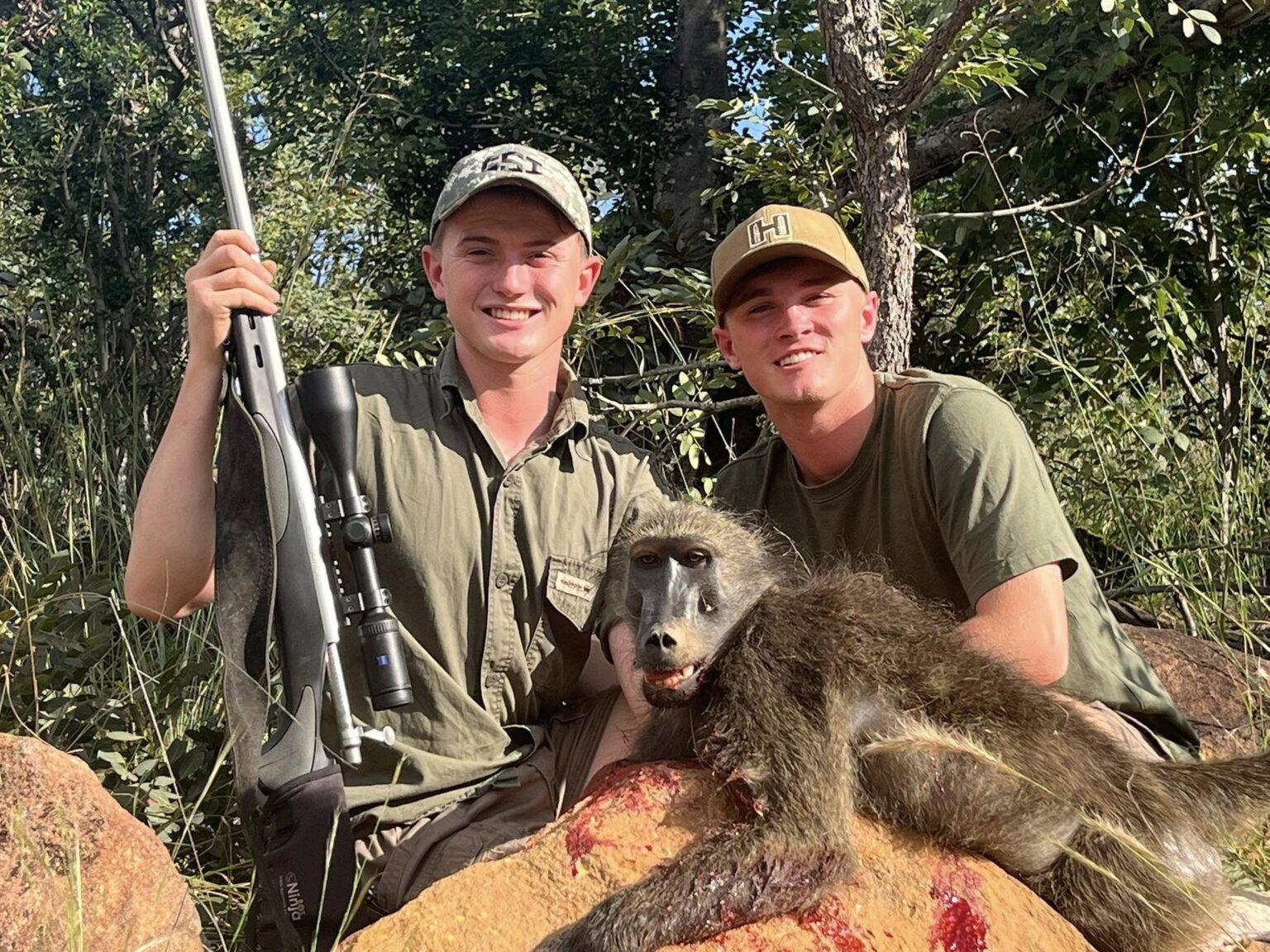Baboon hunting in Africa offers a unique challenge for hunters looking to experience diverse game in natural settings. These intelligent and adaptable animals roam the continent’s wild landscapes, making each hunt a test of skill and patience. As part of our commitment to ethical hunting, we follow strict regulations to ensure that every baboon hunt supports conservation and the long-term balance of wildlife populations.
We understand that planning an African hunting safari is about more than just the pursuit. It’s about connecting with the land, respecting local ecosystems, and experiencing the thrill of the hunt in a responsible way. Whether you’re new to baboon hunting or seeking to add to your African game experience, our safaris are designed to provide safe, expertly guided opportunities that highlight both adventure and sustainability.
[DYNAMIC-BLOGTABLEOFCONTENT]

Key Takeaways
-
Baboon hunting in Africa is both a challenging pursuit and a vital tool for wildlife management, supporting ecosystem balance and sustainable land use.
-
Ethical baboon hunts strictly follow legal regulations, including required permits, seasonal restrictions, and humane practices to ensure responsible population control.
-
Understanding baboon species, habitats, and behaviors is essential for planning a successful safari and upholding conservation-focused principles.
-
Proper preparation—selecting the right gear, location, and timing—significantly increases success and compliance during baboon hunting adventures.
-
Conservation-driven baboon hunts generate social and economic benefits for local communities and directly fund wildlife and habitat protection efforts.
Understanding Baboon Hunting
Baboon hunting in Africa stands out for its complexity and demands. It’s not just a pursuit; it’s a careful blend of conservation, skill, and respect for wildlife. How does this fit into modern african hunting safaris and what are the rules and motivations that guide legal, ethical baboon hunting?
Reasons and Ethics Behind Baboon Hunting
Managing baboon populations helps maintain balance across private game reserves in Africa. Baboons, found in countries like South Africa, Namibia, and Zimbabwe, often impact crops, challenge the safety of local fauna, and create conflicts with human settlements. Guided baboon hunts offer an avenue for responsible population control, benefiting local biodiversity and sustainable land use.
Ethical baboon hunting relies on strict conservation standards. We plan hunts in line with environmental targets, always following legal and moral obligations to ensure healthy baboon numbers and protect the larger ecosystem. Professional hunters in Africa support these practices, emphasizing fair chase and humane methods.
Common reasons for baboon hunting africa include:
-
Population control for land and resource management
-
Damage reduction to agriculture and infrastructure
-
Harvesting animals for trophies on baboon hunting safaris
-
Supporting community livelihoods and local economies
Are we making the most out of free range baboon hunting or trophy baboon hunting while staying responsible? That’s where legal requirements make the difference.
Legal Aspects and Regulations
Legal baboon hunting is subject to national and international regulations, particularly for those interested in hunting baboons in South Africa or across major safari destinations. Each region maintains permits for hunting baboons legally, often requiring a detailed application and clear adherence to quotas. For example, hunters in South Africa must obtain specific hunting permits before their safari and, if exporting trophies, complete additional paperwork for CITES compliance.
A quick look at regulatory elements:
|
Region |
Permit Needed |
Trophy Export |
Seasonal Restrictions |
|---|---|---|---|
|
South Africa |
Hunting permit, CITES |
Yes, CDC or export docs |
Year-round, preferred May-Oct |
|
Namibia |
Hunting permit |
Yes, CITES export |
Year-round |
|
Tanzania |
Hunting permit |
Yes, CITES export |
Year-round |
|
Zimbabwe |
License, CITES |
Yes, CITES export |
Year-round |
Hunting packages typically resolve these details—our team or your operator handles permits, export arrangements, and quota compliance. And, rules around ethical baboon hunting mean using suitable equipment, employing trained guides, and following best practices for humane harvests.
Considering a baboon hunt? Always check local regulations, plan with experienced outfitters, and look for hunting packages that prioritize safety, compliance, and conservation hunting africa. This keeps each hunt both rewarding and within the bounds of environmental and legal standards.
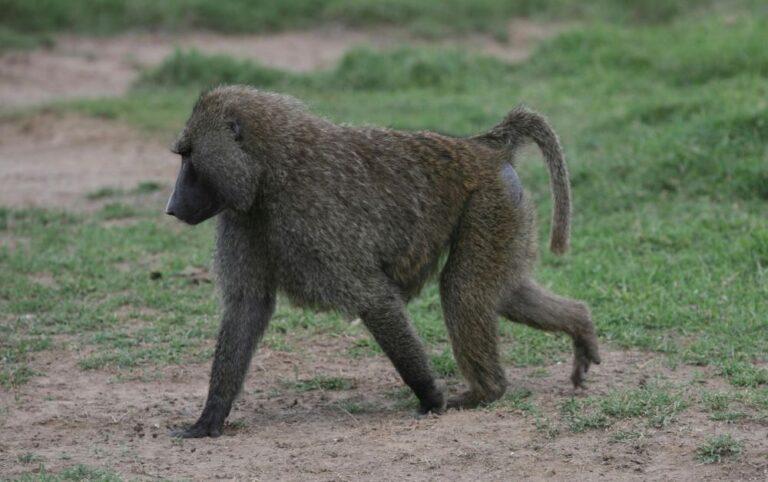
Baboon Species and Habitats
Baboon hunting in Africa presents unique opportunities due to the continent’s biodiversity and varied landscapes. Understanding the main baboon species and their habitats is essential for planning successful and legal baboon hunting safaris.
Common Species Hunted
Most baboon hunting in Africa focuses on these key species, each offering different challenges for African hunting safaris:
-
Chacma Baboon (Papio ursinus)
Found mainly in Southern Africa, including South Africa, Botswana, Namibia, Zimbabwe, and Mozambique. Chacma baboons are the largest and most commonly targeted species for trophy baboon hunting and guided baboon hunts. Males can weigh up to 40 kg and have pronounced social hierarchies, which influence hunting patterns.
-
Olive Baboon (Papio anubis)
Common across East and Central Africa—Tanzania, Uganda, Ethiopia, Cameroon, and more. Olive baboons are regularly encountered during dangerous game hunting because of their wide range. Their adaptability and large group sizes make legal baboon hunting challenging yet rewarding.
-
Yellow Baboon (Papio cynocephalus)
Found mostly in north-east South Africa, Botswana, Zambia, Zimbabwe, and up to northern Mozambique. Yellow baboons can sometimes crossbreed with other species where ranges overlap. While not as commonly targeted in baboon hunting packages as Chacma, they are still sought after in certain regions.
-
Hamadryas Baboon (Papio hamadryas)
Located mainly in Ethiopia and the Horn of Africa. They prefer arid and rocky regions but hunting is less widespread due to their limited range.
-
Guinea Baboon (Papio papio)
Occurs in West African countries such as Guinea, Mali, and Senegal. Guinea baboon hunting is rare and typically only part of specialized African hunting experience packages.
Typical Habitats and Behavior
Baboons thrive in diverse environments, influencing their behavior and hunting methods:
Primary Habitats
-
Savannas and Grasslands
Most baboons, especially Chacma and Olive, are commonly spotted in open savanna and grassland environments. These areas offer excellent opportunities for free range baboon hunting and baboon population control, as large troops often raid crops and forage near water sources.
-
Mountainous Regions
In southern Africa, baboons adapt well to rocky hills and escarpments, using high vantage points to spot both predators and hunters. Baboons in these regions can be especially challenging to hunt, often requiring expert tracking skills from professional hunters Africa.
-
Woodlands and Forest Edges
Some troops occupy mixed woodland environments, leveraging dense cover for concealment. Hunting baboons with rifle in these locations requires patience and the ability to adapt stalking techniques based on habitat density.
Social and Behavioral Traits
-
Social Troops
Baboons live in large, tightly knit groups called troops, often comprising up to 40 individuals. Dominant males maintain hierarchy and act as sentries, making trophy baboon hunting a strategic undertaking—one loud alarm call can scatter the group.
-
Omnivorous Diets
Their diet of roots, seeds, insects, fruits, and small mammals explains their presence across farmlands and varied terrains, occasionally causing human-wildlife conflict and prompting the need for legal baboon hunting for population management.
-
Adaptability and Intelligence
High intelligence allows baboons to differentiate between threats and adapt behaviors, making guided baboon hunts in private game reserves Africa both challenging and rewarding.
By knowing which baboon species populate specific regions and understanding their habitat preferences, we improve success rates and promote conservation hunting Africa principles through sustainable and ethical baboon hunting.
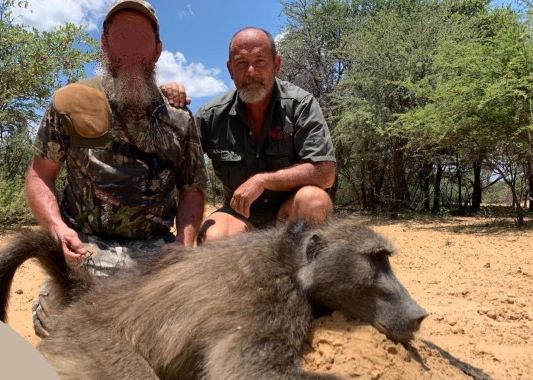
Preparing for a Baboon Hunt
Preparing for a baboon hunting safari in Africa combines careful planning, practical equipment selection, and knowledge of both terrain and baboon habits. Success in these hunts ties closely to preparation and knowing exactly what you’ll need for the African hunting experience.
Essential Gear and Firearms
Choosing gear for baboon hunting Africa sets the stage for safe, ethical, and effective hunts. Most hunts call for a flexible rifle paired with a variable magnification scope—think reliable calibers like .223, .243, or .270, which adapt well to both close and longer shots. Professional hunters Africa often recommend optics that can switch quickly between magnifications for moving targets.
Pack clothing that blends with the environment—neutral, earth-tone, or camouflage is smart for stalking wary baboon troops. Footwear must match the terrain you’re traveling, whether it’s rocky mountains, riverbanks, or savanna grasslands. Want an extra edge spotting distant sentries? Bring quality binoculars for glassing, usually 8x or 10x magnification.
Consider a daypack with water, energy bars, and other basics. And if you’re heading into regions with thorns or thick brush, gaiters or lightweight arm guards might help. For those trying trophy baboon hunting, don’t forget game bags and tags as required for legal baboon hunting.
Checklist: Baboon Hunting Gear
|
Gear Item |
Usage |
|---|---|
|
Variable Magnification Rifle + Scope |
Versatile for all ranges |
|
Camouflage or Neutral Clothing |
Effective concealment in terrain |
|
Quality Binoculars |
Locating and observing baboons |
|
Durable Footwear |
Adapting to rocky, open, or wet terrain |
|
Daypack & Water Supply |
Sustaining energy and hydration |
|
Gaiters/Protective Gear |
Protection from brush and thorns |
|
Game Bags & Tags |
Ethical and legal specimen handling |
Selecting the Right Location and Time
Choosing locations and timing for baboon hunting safaris affects hunt quality and ethics. The leading destinations include South Africa, Zimbabwe, Namibia, and Tanzania. These countries offer legal baboon hunting experiences, each known for abundant baboon populations and well-managed private game reserves Africa.
The dry season, usually May to October, lines up as the prime baboon hunting window. During this period, fewer leaves on the trees mean clearer lines of sight, and baboons’ increased reliance on water holes makes them easier to spot or stalk. For hunters focused on conservation hunting Africa, these months usually sync with strict game laws and optimal conditions for wildlife and habitat sustainability.
Ask yourself, do you prefer free range baboon hunting, or would you rather hunt within established reserves? Each approach offers unique challenges and rewards. Consult local outfitters about available baboon hunting packages, pricing, and regional regulations—these details shape the tailored African hunting safaris experience and support both legal compliance and ethical baboon population control.
Best Baboon Hunting Regions:
|
Country |
Highlight |
|---|---|
|
Chacma baboon, structured private reserves |
|
|
High baboon density, adaptable terrain |
|
|
Open landscapes, diverse hunting environments |
|
|
Wild, large game conservancies |
For those combining baboon hunts with Africa big game hunts or dangerous game hunting, coordinating locations with broader hunting plans offers greater value and a diverse adventure. And for affordable hunting safaris, some outfitters bundle baboon with other small-game targets.
Want to increase your odds? Research game behavior for the region, discuss plans with professional hunters, and check local restrictions to keep everything above board. That’s how preparation turns a guided baboon hunt into a successful, memorable event.
Baboon Hunting Methods
Baboon hunting in Africa calls for specialized strategies matched to the animal’s intelligence and environment. We see hunters use a mix of skills and adaptability for trophy baboon hunting, with both spot-and-stalk and baiting techniques common across professional hunting safaris.
Spot-and-Stalk Techniques
Spot-and-stalk remains a favorite method for hunting baboons in South Africa and across private game reserves in Africa. We look for troops in open country, ridges, or rocky outcrops since baboons prefer high points for safety. Their sharp eyesight and active sentries make undetected stalking a challenge—approaches often require patience and cover.
-
Hunters use quality binoculars to locate and observe baboon behavior from a distance
-
Movement stays low and slow, making use of natural features like rocks and bushes
-
Free range baboon hunting often means longer shots; rifles in .270, 7mm Rem Mag, or .30-06 offer flexibility
-
A quick whistle or predator call sometimes halts baboons, offering a brief shot opportunity
Spot-and-stalk hunting fits hunters who want action and mobility, but expect to spend time glassing and waiting for a clear line of sight. And if a sentry spots movement, the whole troop may scatter—fast reflexes matter.
Baiting and Blinds
Baiting, paired with blinds, increases the odds for legal baboon hunting, especially for those targeting trophy baboon hunting in Africa.
-
Guides set up bait like fruit (oranges work well) near waterholes or feeding trails
-
Hunters wait in concealed blinds, usually within 30 to 60 yards, reducing the risk of detection by sharp-eyed baboons
-
Blinds offer great conditions for hunting baboons with a rifle or bow, especially in areas with thick cover or unpredictable troop movement
Daylight hours and water scarcity during the dry season (May to October) often bring baboons to regular bait sites. And sitting silently in a well-camouflaged hide gives us a solid shot at a mature male.
These baboon hunting methods both support population control and conservation hunting principles in Africa. When done with professional hunters in Africa, each technique follows ethical and legal standards, upholding sustainable baboon hunting safaris across the continent.
Trophy Assessment and Shot Placement
Trophy assessment and shot placement are two core aspects of successful baboon hunting in Africa. Careful evaluation helps hunters identify trophy-quality baboons, while ethical shot placement ensures a humane outcome and supports responsible hunting practices.
Judging a Trophy Baboon
When considering trophy baboon hunting, evaluating key features helps us select prime specimens and enhances the value of African hunting safaris.
-
Size and Sex: Mature male baboons make the best trophies. These animals stand 26–36 inches (66–91cm) at the shoulder and often weigh 70–135 pounds (32–61kg). Males show greater size and bulk than females, making them easier to identify.
-
Physical Characteristics: Large males usually display prominent canine teeth and gray hair across the mane and shoulders. Their faces, muzzles, and conspicuous sexual organs also differentiate them from females.
-
Condition and Age: Assessing the overall condition is vital. Older males might show signs like worn teeth or scars from fights, indicating dominance and maturity.
-
Behavior: Dominant males often position themselves at the edge of the troop, exhibit bolder behavior, or act as sentries. These traits point to strong, experienced individuals suitable for trophy collection.
-
Uniqueness: Some hunters look for distinctive features—such as long canine teeth or unique coloration—for a more memorable trophy.
Selecting a trophy baboon during guided baboon hunts relies on patience and observation, particularly in challenging environments like private game reserves in Africa.
Best Practices for Ethical Shot Placement
Ethical shot placement stands at the heart of baboon hunting Africa and legal baboon hunting practices. Proper targeting ensures quick, humane harvests and upholds conservation hunting Africa standards.
-
Vital Area Targeting: The chest area remains the prime target for hunting baboons with rifle or bow. The heart-lung zone, similar in physiology to humans, promises a high chance of an ethical and effective shot.
-
Preferred Angles: When quartering to, hunters should aim at the inside of the closer shoulder to reach vital organs. Broadside and slightly quartering shots offer the widest margin for error.
-
Distances: Most ethical shots occur at 30–60 yards from blinds or 20–40 yards for bowhunters, depending on the specific situation and hunter skill. Long-range shots, such as those taken in mountainous regions, demand extra caution and confidence in ballistics.
-
Rifle and Caliber Choice: Small to medium bore rifles (.270, 7mm Rem Mag, .30-06) deliver the accuracy and energy needed without causing excessive damage.
-
Baboons’ Aggression: Injured baboons might react aggressively. Accurate placement limits suffering and protects hunters from possible counterattacks, a concern referenced in professional hunters Africa narratives.
We always endorse ethical baboon hunting by respecting local regulations, using suitable equipment, and committing to quick, clean harvests. These best practices contribute to sustainable baboon population control and reinforce our professional reputation on every African hunting experience and affordable hunting safaris we operate.
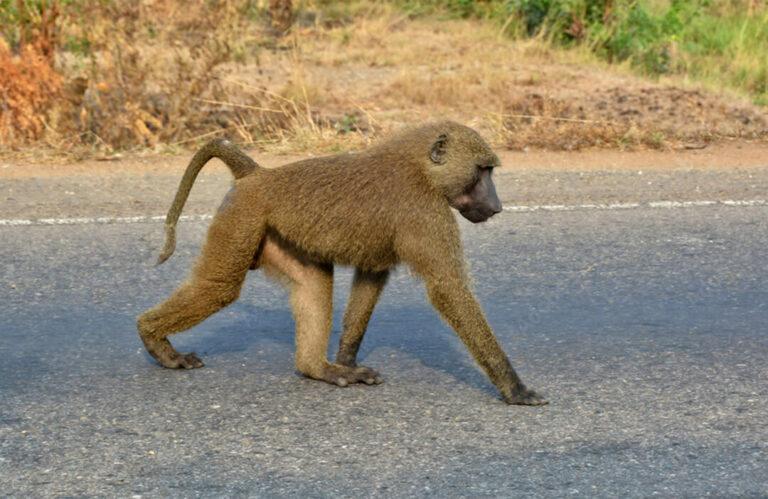
Conservation and Impact Considerations
Baboon hunting in Africa ties closely to conservation hunting principles, with every legal baboon hunting operation regulated to ensure sustainability. Across private game reserves in Africa, baboon population control protects habitat health and limits extensive crop damage. Let’s explore why conservation and impact assessments matter so much in this environment.
Why Baboon Hunting Matters for Conservation
Guided baboon hunts on private game reserves impact more than just the baboon populations. When these animals overpopulate, they compete with native wildlife for limited resources, sometimes damaging areas meant for other species. We target baboon hunting in Africa as a responsible management tool.
-
Ecosystem Balance: Managed hunting helps keep the ecosystem balanced, giving native grazers and browsers room to thrive.
-
Reduced Human-Wildlife Conflict: Controlled baboon numbers decrease conflicts with nearby farms and lodges.
-
Habitat Protection: Fewer baboons mean less destruction in sensitive environments.
Regulatory Framework and Ethics
Ethical baboon hunting depends on following strict rules. We always check for up-to-date permits, observe quotas, and hunt only within open seasons. These legal baboon hunting practices promote wildlife conservation and fair chase ethics. For trophy baboon hunting, we ensure compliance with all export guidelines, including CITES where needed.
|
Regulatory Aspect |
Implementation Example |
|---|---|
|
Permits & Licensing |
CITES permit for baboon export |
|
Quotas & Seasonal Restrictions |
May-Oct preferred in S. Africa |
|
On-site Professional Supervision |
Guided by licensed PHs |
|
Landowner Permissions |
Only hunt on approved reserves |
Social, Economic, and Environmental Impact
Baboon hunting safaris support local communities and preserve the African hunting experience for future hunters. Because guided hunts create jobs and fund anti-poaching teams, they feed money directly back into conservation programs.
-
Community Benefits: Jobs for trackers, cooks, and guides.
-
Conservation Funding: Revenue reinvested in land management and wildlife protection.
-
Research Support: Some hunting packages fund research on baboon behavior and ecosystem effects.
How We Practice Conservation-Focused Hunting
For ethical baboon hunting, we stick to these standards:
-
Only accept hunting packages from reputable operators with proven conservation records.
-
Use free range baboon hunting zones, where wild baboons move naturally.
-
Always combine hunts with habitat preservation activities and community involvement.
Monitoring and Adaptive Management
To keep our impact minimal, we regularly review hunting statistics and adjust quotas based on scientific surveys. This leaves room to adapt quickly if baboon numbers shift or their impact on the environment changes.
Baboon hunting Africa, done right, strengthens both wildlife management and long-term habitat protection. By supporting conservation hunting Africa, we protect the future of both trophy hunting and local ecosystems while offering guided baboon hunts that matter.
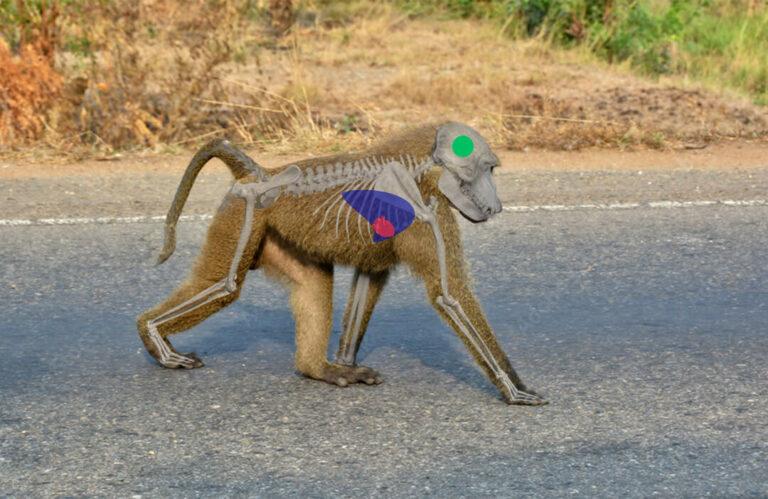
Conclusion
Baboon hunting in Africa calls for a thoughtful balance of skill, preparation, and respect for both wildlife and local communities. When we approach this pursuit with ethical standards and a commitment to conservation, we help protect ecosystems and support sustainable hunting traditions.
By working with reputable guides and following all regulations, we ensure our hunting experiences are safe, responsible, and beneficial to the land. Let’s continue to prioritize ethical practices and conservation to preserve Africa’s wild spaces for generations to come.
Expand Your African Hunting Experience
If you’re intrigued by the challenge of baboon hunting, why not pair it with a full plains game or dangerous game safari? Explore our curated hunting packages across South Africa, Namibia, and Zimbabwe—each offering world-class hunts for species like kudu, impala, zebra, warthog, and even Cape buffalo. Whether you’re after a multi-species combo hunt or a focused trophy expedition, our outfitters ensure ethical, professional, and unforgettable hunting experiences.
→ View all African hunting listings and start planning your next adventure.
Frequently Asked Questions
Why are baboons hunted in Africa?
Baboons are hunted in Africa mainly for population control, as they can damage crops and create conflicts with local communities. Regulated hunting also helps maintain ecosystem balance and supports conservation efforts.
Is baboon hunting legal in African countries?
Yes, baboon hunting is legal in several African countries, but it is strictly regulated. Hunters must obtain the proper permits, follow seasonal restrictions, and comply with local conservation laws.
What are the main baboon species hunted in Africa?
The primary baboon species hunted in Africa include the Chacma, Olive, Yellow, Hamadryas, and Guinea baboons. Each species inhabits different regions and presents unique hunting challenges.
How does baboon hunting contribute to conservation?
Managed baboon hunting helps control populations, reducing human-wildlife conflict and preserving habitats. Revenues from hunting often support local communities and fund broader wildlife conservation initiatives.
What equipment is recommended for baboon hunting
Essential equipment includes a flexible rifle with variable magnification scope, camouflage clothing, quality binoculars, and sturdy footwear. Hunters are also advised to bring weather-appropriate gear and basic medical supplies.
What are the best African countries for baboon hunting safaris?
Top destinations for baboon hunting safaris include South Africa, Zimbabwe, Namibia, and Tanzania. These countries offer diverse habitats, experienced outfitters, and well-established hunting regulations.
When is the best time to hunt baboons in Africa?
The dry season, typically from May to October, is the best time for baboon hunting in most African regions. During this period, baboon movements and behaviors are more predictable.
What hunting methods are most effective for baboons?
Common methods include spot-and-stalk, where hunters approach baboon troops stealthily, and baiting with blinds, where hunters wait at concealed locations near bait sites.
What legal requirements must hunters fulfill for baboon hunting?
Hunters must secure the appropriate permits, adhere to species-specific quotas, and follow all local and international regulations on trophy export and seasonal restrictions.
How does ethical hunting support sustainability?
Ethical hunting ensures compliance with laws, prioritizes animal welfare, and supports local communities. It contributes to sustainable wildlife management while minimizing environmental impact.
